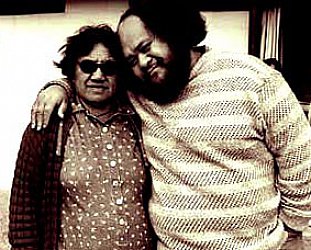Graham Reid | | 1 min read
Wai: Hone Taiapa

When the debut album, 100%, by Maaka McGregor and Mina Ripia (aka Wai) was released in 2000 (see here) it was hailed as a ground-breaking event for its deft blend of te reo (Maori language) and electronica.
Yet in many ways the musical landscape had been laid by the likes of Dalvanius with Patea Maori, and then Moana who had also sung in te reo and used the sound of amplified poi (and, in Moana's case, traditional instruments).
Wai's 100% was widely acclaimed on the international stage -- where McGregor and Ripia subsequently spent much of their time -- and its subtle beats and sense of exoticism made them darlings in the global village.
But 100% wasn't entirely convincing to these ears, it seemed more limited in its emotional range than some of its champions were prepared to admit and, although highly likeable, you sensed there was much more and better to come from this duo who had considerable credibility for their previous work in bands like Aotearoa, Moana and the Moa Hunters and others.
Well, it has taken a long time to come, but now -- a decade later -- is the follow-up to 100% and it is a much more confident, musically expansive and emotionally interesting album.
It still starts off from the same premise -- te reo, songs based on the waiata/chant style, rhythm-driven electronica -- but now some of the material stretches into impressive new areas: He Tapu Koe/You Are Sacred featuring Warren Maxwell, formerly of Trinity Roots, is a hypnotically ambient piece for example; and Faifai Malie right at the end brings together musical ideas from Samoan slap dancing with the sound of the Maori poi once it gets going.
Mei Kore Koe (with Phil Leota Smith) is like a stalking chant over quietly bubbling keyboard funk (it is about the seabed and foreshore land march and has a similar sense of momentum that Marley's Exodus possessed) and the lovely Tirama is a prayer to the night sky with soft synth flashes like shooting stars and increasing urgency.
The album opens with Ripia's multi-tracked vocals on the brief Tuhia Te Ha (a salute to the maori language) before things get down to business on the laidback synth-driven Hine-Te-Ihorangi with vocalist Mark Te Whare which sets the tone for an album which weaves between an outdoor dancefloor on slow, warm nights (Maranga Ake Ai) and spiritual reflectiveness (Hine Te Iwaiwa).
If 100% was the album which took Wai to the world (although critically acclaimed at home it rather went by most locals) then this is the one which should provide the tasteful, thoughtful soundtrack to the summer to come -- and many more after that.
A decade is a long time between albums.
It has been well worth the wait.






post a comment